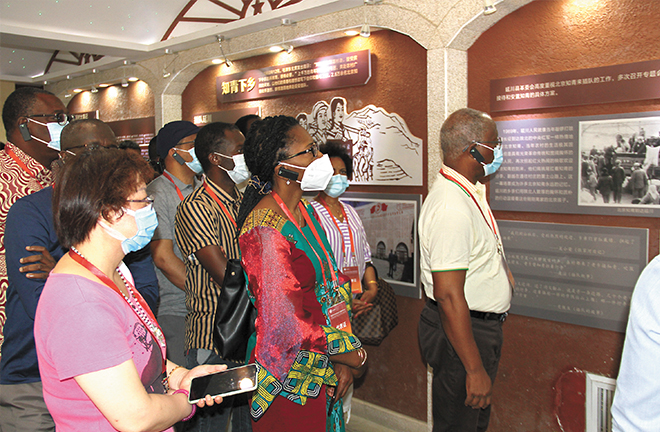China shares poverty reduction experience with Africa

African representatives visit the history museum of Liangjiahe Village in Yan’an, Shaanxi Province. Photo: Lu Hang/CSST
YAN’AN—Africa can benefit from China’s poverty alleviation experience, said experts at an international seminar in Yan’an, Shaanxi Province, on July 31.
Hosted by the China-Africa Institute and co-organized by the Foreign Affairs Office of Shaanxi Province, the seminar was themed “the Yan’an spirit and China’s poverty alleviation.”
Global significance
“The valuable experience that China has gained in the practice and exploration of poverty reduction belongs to both the country and the world. China is willing to further strengthen exchanges and cooperation in poverty reduction with African countries, work together to advance the international poverty reduction process, and jointly build a community of shared future for mankind where poverty is eliminated,” said Wang Linggui, vice president of the Chinese Academy of Social Sciences and president of the China-Africa Institute.
The year 2021 marks the CPC’s centennial, Wang continued. China has now achieved its first centenary goal of building a moderately prosperous society in all respects. Absolute poverty has also been eliminated, which has historic significance.
Strong political will, clear digital indicators, continuous resource investment, precise assistance measures, and extensive mobilization are the key factors for China’s success in poverty alleviation, said Wang Chaowen, a distinguished research fellow at the China-Africa Institute. China’s successful experience in poverty alleviation has injected new vitality into strengthening exchanges and mutual learning between China and Africa. China’s successful development model, especially China’s path, system, ideas, and approaches, has provided new choices for the world, especially other developing countries.
As the world is still facing serious poverty, it is urgent to scientifically summarize China’s successful experience in poverty alleviation so that it can be replicated and used for reference across the globe, according to Guo Chongli, another distinguished research fellow at the China-Africa Institute.
“China’s successful experience in poverty alleviation is a valuable asset for international poverty reduction and high-quality public goods that China contributes to the world,” Guo noted.
Getting out of poverty is of great concern to the leaders of African countries. There are hundreds of millions of people living below the absolute poverty line in Africa today. China’s victory in poverty alleviation has not only made outstanding contributions to the development of human society, but also set a very good example for the entire African continent, said Martin Mpana, dean of African Group in Beijing and Cameroon’s ambassador to China.
Two days before the seminar, he and some other African ambassadors to China visited Nangou Village, Liangjiahe Village, Yangjialing, and the Zaoyuan Revolutionary Site in Yan’an. The trip facilitated a more in-depth understanding of Yan’an’s history and its achievements today, Mpana said. What he saw and heard along the way made him feel more and more deeply that China’s tremendous achievements in poverty alleviation are a miracle on earth, he commented.
Poverty reduction cooperation
Since 2010, China and Africa have been cooperating to host a series of meetings which constitute the Africa-China Poverty Reduction and Development Conference, conducting in-depth discussions on a wide range of topics.
In May 2014, during Chinese Premier Li Keqiang’s visit to the African Union headquarters, China and the African Union signed an outline of a joint program for strengthening cooperation on poverty reduction.
In 2015, the Africa-China Poverty Reduction and Development Conference was formally incorporated into the overall framework of the Forum on China-Africa Cooperation (FOCAC), bringing China-Africa cooperation on poverty reduction to a new height.
At present, China-Africa poverty reduction cooperation is transforming from government assistance to interactive participation by governments, enterprises, and non-governmental organizations. It is expanding from agriculture, medicine and health, and other traditional fields to human resources development cooperation. In addition, it is also extending from bilateral cooperation to include multilateral cooperation. As the Belt and Road initiative is deeply integrated with the African Union’s 2063 Agenda, and the UN’s 2030 Agenda for Sustainable Development is aligned with African countries’ development strategies, a global cooperation mechanism with extensive coverage, participation, and inclusiveness is taking shape.
China is the first developing country to meet the poverty eradication target set in the UN’s 2030 Agenda for Sustainable Development, providing a reference model for African countries to carry out poverty reduction, said Rahamtalla Mohamed Osman Elnor, permanent representative of the African Union to China.
Since the FOCAC’s establishment, China-Africa cooperation has made positive contributions to promoting sustainable development and improving people’s livelihoods in Africa. There is still a lot of room for cooperation between China and Africa in the future, he said.
Africa is rich in natural resources and has a large youth population, but the problem of poverty is prominent, he continued. The African Union has always been committed to seeking solutions to poverty. It has now proposed a series of plans, including the Comprehensive Africa Agriculture Development Programme and the Programme for Infrastructure Development in Africa, which have been included in the first ten-year plan of its Agenda 2063. In addition, Africa is also accelerating the construction of a free trade zone and improving Africa's economic and social conditions through integrated development.
The most urgent task for African countries is to learn from China's experience and formulate development strategies based on their own realities, block the intergenerational transmission of poverty, and achieve the goal of poverty alleviation, said Antonio Serifo Embalo, Guinea-Bissau's ambassador to China.
He added that while China is committed to eradicating its own poverty, it has provided assistance and support within its capacity to other developing countries, including African countries. China has been actively carrying out South-South cooperation and promoting the high-quality development of China-Africa joint construction of the Belt and Road.
Edited by JIANG HONG
